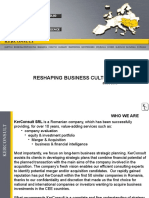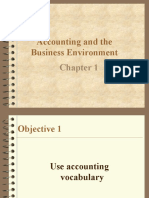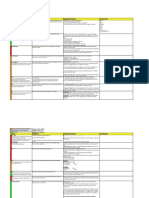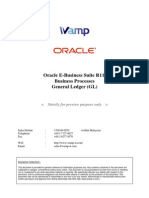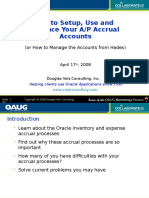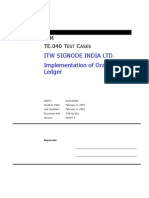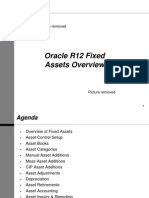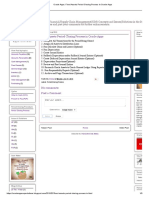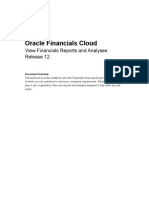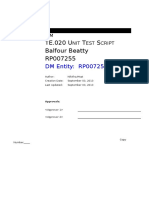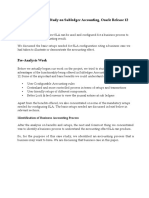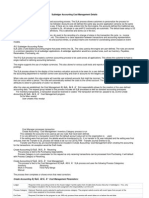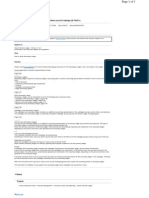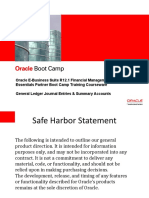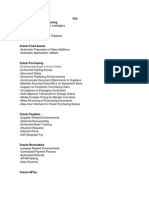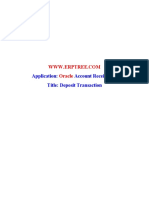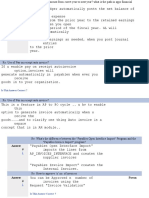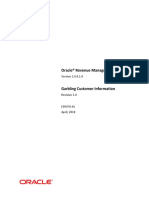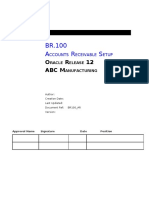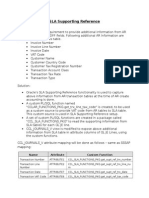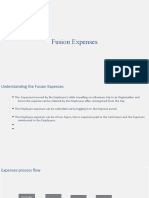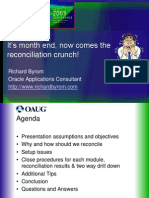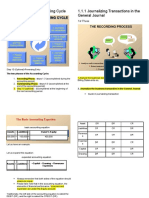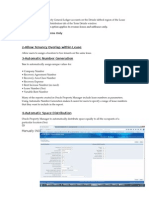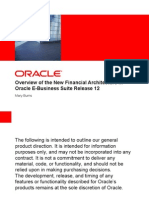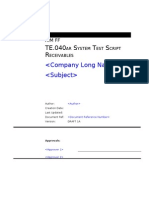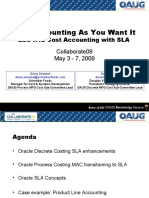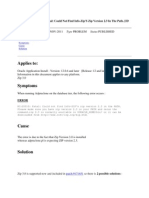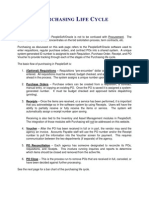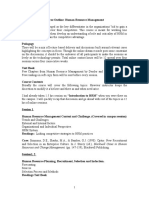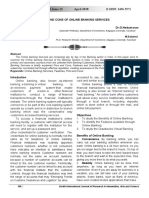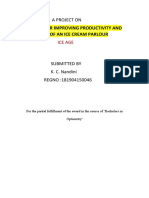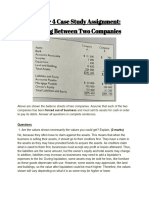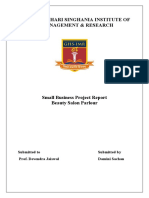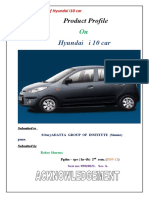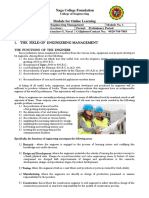Best Practices For Oracle Receivables
Best Practices For Oracle Receivables
Uploaded by
Hussein SadekCopyright:
Available Formats
Best Practices For Oracle Receivables
Best Practices For Oracle Receivables
Uploaded by
Hussein SadekOriginal Title
Copyright
Available Formats
Share this document
Did you find this document useful?
Is this content inappropriate?
Copyright:
Available Formats
Best Practices For Oracle Receivables
Best Practices For Oracle Receivables
Uploaded by
Hussein SadekCopyright:
Available Formats
Best Practices for
Oracle Receivables
Cathy Cakebread
Consultant
NorCal OAUG Training Day 2009
Copyright © 2009 - Cathy Cakebread 1
Agenda
Introduction
Cash Application
◦ Setup
◦ Processing
Transactions
◦ Setup
◦ Processing
Adjustments
◦ Setup
◦ Processing
Close and Reconciliation
Separation of Duties
Copyright © 2009 - Cathy Cakebread 2
Cash Application - Setup
Note: Bank Accounts Are Usually Shared
With Accounts Payable
Ideal To Use A Slightly Different GL Account
(e.g., Subaccount) for Cash Than AP Uses
for Reconciliation Purposes
Watch Accounts You Use!!
◦ Can Cause Serious Issues
Copyright © 2009 - Cathy Cakebread 3
Receipt Classes
Setup Receipts Receipt Classes
Copyright © 2009 - Cathy Cakebread 4
Receipt Classes –
Payment Methods
Cash – Should Be The Only Field That Uses
A Real Cash Account
Receipt Confirmation – For Credit Cards
And Automatic Receipts – Should Be A
Unique Account
Remittance - For Credit Cards And
Automatic Receipts – Should Be A Unique
Account
Bank Charges – Should be An Expense
Account
Copyright © 2009 - Cathy Cakebread 5
And…
Unapplied Receipts – Should Be A Unique
Account (Not AR Or Cash Account!)
Unidentified Receipts – May By The Same As
The Unapplied Account But Better If Different (Not
AR Or Cash Account!)
On Account Receipts – Ideally Unique Account =
A “Liability” - (Not AR Or Cash Account!)
Unearned Discounts – Unique Expense Account
(Receivables Activity)
Earned Discounts – May Be The Same As
Unearned But Ideally Unique (Receivables Activity)
Copyright © 2009 - Cathy Cakebread 6
Cash Accounting
Apply Receipt Immediately to An Invoice
Debit Credit
Cash (Receipt Class) Unapplied Cash (Receipt Class)
Unapplied Cash (Receipt Class) AR (Based On The Invoice You
Are Paying)
Note: 4 Sided Entry
Apply Receipt Immediately to An Invoice With A Discount
DEBIT Credit
Cash (Receipt Class) Unapplied Cash (Receipt
Discount (Receipt Class - Class)
Based On Whether Earned Or AR (From The Invoice)
Unearned)
Unapplied Cash (Receipt
Class)
Copyright © 2009 - Cathy Cakebread 7
And More Cash Accounting
Leave As Unapplied
DEBIT CREDIT
- Cash (Receipt Class) - Unapplied Cash (Receipt Class)
Apply Unapplied Amount
DEBIT CREDIT
- Unapplied Cash - AR (Based on the Invoice(s)
(Receipt Class) You Are Paying)
Unapply and Re-Apply
DEBIT
- AR (From the Original Invoice CREDIT
That You Are Unapplying - Unapplied Cash (Receipt Class)
- Unapplied Cash (Receipt Class) - AR (Based on New the Invoice(s))
Copyright © 2009 - Cathy Cakebread 8
Lockbox
Ideally:
◦ Include Both Invoice Number AND Amount From Customer
Remittance Advise
Can Take Months To Establish With Your Bank
“Auto” Lockbox Is Not “Automatic” Receipts
◦ Considered To Be Manual
Work With Bank To Improve Quality Of Data
Received
◦ Provide Examples
Complete Batches Only!
◦ Consistent With Bank Batches
Allow Payment of Unrelated Invoices? Never!
Copyright © 2009 - Cathy Cakebread 9
Processing Cash
Closed Batch – Eek!
◦ Meaningless!!!
Only Use On Account If It Truly Is “Cash In Advance” Or
Prepayment
Resolve Unapplied And Unidentified ASAP
Prompt Payment Discounts?? May Be An Issue Again
With Current Economy
Non-AR Cash (Miscellaneous Cash)
◦ Process All In AR
◦ Predefine As Much As Is Possible
◦ Watch Account Controls
Re-Enter In New Period (e.g., for Reverse and Re-Enter)
◦ Use Special Day E.G., Sunday
Copyright © 2009 - Cathy Cakebread 10
And…
Naming Conventions
◦ Batch Names
Deposit Date – Bank
01212009-boa
◦ Lockbox Batch Names
Deposit Date – Bank
01212009-boa
Reverse Receipts:
◦ Debit Memo Vs. Re-open Invoice
Debit Memo Rewards Them For Bouncing A Check
New Due Date
Utilize Controls for Cash Received In House
Copyright © 2009 - Cathy Cakebread 11
Credit Card Processing
Always Protect Customer Credit Card Numbers!
◦ Only Show First 4 or Last 4
Auto Schedule Processes – Available In 11.5.10+
Quickly Resolve Items Stuck In Confirm And
Remit Status
Use Cash Management To Clear Using Actual
Bank Data (If Possible)
Pre-Authorize? Re-Auth Time Frame?
Verify That All Transactions Were Actually Passed
from the Service Provider
Copyright © 2009 - Cathy Cakebread 12
Credit Card Accounting Impact
(In AR ONLY)
Activity Debit Credit
Create Receipt Confirmation Account AR (Based on the
(AR Trade Credit Card Invoice)
Clearing?? Use New
Unique Account!)
Remit Receipt Remittance Account Confirmation Account
(Use the same (Offsets the
account for Confirmation
Remittance and Account)
Confirmation?)
Ideally – Use a
Different Account)
Clear Cash Remittance Account
(Offsets the
Remittance Account)
Note: The invoice is marked as closed when the receipt is
created, not when the cash is deposited!
Copyright © 2009 - Cathy Cakebread 13
Transactions - Setup
Setup Transactions Transaction Types
Copyright © 2009 - Cathy Cakebread 14
Transaction Types
Natural Application Only!!
Allow Overapplication – Never!!
Use Meaningful Names
◦ Especially First 4 Characters
◦ E.G., PIGI –
Palo Alto International Government Invoices
◦ Selection Tool For Standard Reports
And – Numbering
◦ Noticeably Different From Sales Order Numbers With Enough
Numbers to Extend Into the Future
At Least One Transaction Type Per AR Account
Primary Driver For Accounts Used In AutoAccounting
Utilize Chargebacks? Deposits?
Copyright © 2009 - Cathy Cakebread 15
AutoAccounting
Setup Transactions AutoAccounting
ACCOUNTING AUTO FREIGHT RECEIVABLE REVENUE TAX UNBILLED UNEARNED
FLEXFIELD INVOICE RECEIVABLE REVENUE
SEGMENTS CLEARING
(Possible Default -Salesreps* - Salesreps -Salesreps -Salesreps - Salesreps* -Salesreps* -Salesreps*
Sources) - Standard - Standard -Transaction -Standard - Standard -Standard Lines -Standard Lines
Lines Lines Types Lines Lines* -Transaction -Transaction
-Transaction -Transaction -Transaction - Taxes Types Types
Types Types Types -Transaction
Types
Transaction Transaction Transaction Transaction Transaction Transaction Transaction
Company Types Types Types Types Types Types Types
Transaction Transaction Transaction Standard Taxes Standard Lines Standard Lines
Division Types Types Types Lines
Transaction Transaction Transaction Standard Taxes Standard Lines Standard Lines
Department Types Types Types Lines
Transaction Transaction Transaction Standard Taxes Standard Lines Standard Lines
Account Types Types Types Lines
Transaction Transaction Transaction Standard Taxes Standard Lines Standard Lines
Subaccount Types Types Types Lines
Special use AutoInvoice - - Bill in Arrears - Bill in Advance
where - Guarantees - Guarantees
revenue not = - Deposits
qty * price
Copyright © 2009 - Cathy Cakebread 16
Transaction - Processing
AutoInvoice Frequency?
◦ Clear Exceptions ASAP – Have Process In Place
◦ Deal With Credits For Closed Invoices?
Approvals for Imported Credit Memos?
Manual Items
◦ Debit Memos – Proper Controls?
◦ Credit Memos – Approvals?
Are the Actual Forms Locked up?
Have All Interfaced Items Made It?
◦ How do You Know? Who is Responsible?
Copyright © 2009 - Cathy Cakebread 17
Revenue Recognition
Revenue Recognition
◦ SOP-97, 98 - AICPA – Statement of Position
◦ SAB 101 – SEC - Staff Accounting Bulletin
Do You Have Items Where Revenue Can’t Be
Recognized Upon Shipment?
Does the Person Entering the Order Know When the
Revenue Should Be Recognized?
◦ When Do You Know? How?
◦ What Determines When Revenue May Be
Recognized?
Do You Have Standard Payment Terms?
◦ Do You Ever Have Exceptions?
Do You Have a Return Policy? e.g., Full Money Back in
30 Days?
Copyright © 2009 - Cathy Cakebread 18
Impacts Revenue Recognition
Do You Use “Arrangements” With Your Customers
(Where the Revenue for One Invoice May Not Be
Recognized Until the Subsequent Items Ship)?
How Do You Deal With “Revenue” for Invoices Where
You Don’t Expect to Receive Payment?
Do You Use Standard Pricing?
◦ How Do You Deal With Variable Pricing and Revenue
Recognition?
How Do You Handle Discounts With Bundled Products?
Do You Sell ‘Beta Products’?
◦ Or ‘Future’ Products
How Does Revenue Recognition Impact Your
Accounting for Cost of Goods Sold?
Copyright © 2009 - Cathy Cakebread 19
Ways to Control Revenue
Define Applicable Accounting Rules
◦ Cover Your Bases
◦ Create As Many as Are Necessary
◦ Tie to Items Where Possible
Utilize Revenue Recognition Wizard and/or
Release 12 “Revenue Recognition Release”
Copyright © 2009 - Cathy Cakebread 20
Adjustments - Setups
Setup Receipts Receivable Activity
Copyright © 2009 - Cathy Cakebread 21
Adjustments – Setup/Process
Define Proper GL Accounts
◦ Should Never Be Your AR Account (It Is Already Offset
Automatically)
Adjust
◦ Select Proper Type
Invoice, Line, Tax, Freight, Charges
Un-adjust
◦ Use Same Accounts As Used With Original Adjustment
Use Limits and Approvals!
Check for Lots of Small Adjustments on Single
Invoice
Copyright © 2009 - Cathy Cakebread 22
Period Close Process
Close Checklist
Close Schedule
Pre-Process As Much As You Can
Reconcile
◦ AR To Aging
◦ AR To GL Activity
Insure AR Only Uses “AR Accounts”
Insure Proper Controls Are in Place
Create Month End Packet
◦ Retain as Needed
Copyright © 2009 - Cathy Cakebread 23
Reconciliation – AR to Aging
ACTIVITY SOURCE
Starting Balance Aged Trial Balance - Old
Invoices Transaction Register
Debit Memos Transaction Register
Credit Memos ( ) Transaction Register
Transaction Register Subtotal
Applied Payments ( ) Applied Receipts Register (Applied Amount Total)
Discounts Taken ( ) Applied Receipts Register (Earned Discount + Unearned Discount)
Unapplied Activity ( ) Unapplied Receipts Register
(On-Account Amount + Unapplied Amount) * -1
Adjustments Adjustments Register (may be + or -)
Items Not Aged ( ) Invoice Exceptions Report
TOTAL
Ending Balance Aged Trial Balance - New
Difference Should be 0 (Total - Ending Balance)
Copyright © 2009 - Cathy Cakebread 24
Tips – Tie to Aging
Journal Entries Report – Summary By
Category
◦ Verify That No Illogical Entries (AR Vs. No AR In Category)
Transaction Register (Split By Company And Currency)
◦ Invoices, Debit Memos, Credit Memos, Commitments
◦ Credit Memo Total Should Be Negative
◦ Watch Bottom Total In 11.5.9 – Includes ALL Currencies
Applied Receipts Register –
◦
Add Totals And Multiply By -1
◦
Result May Be Negative Or Positive
◦
Note That Total Does Not Include Discounts In 11.5.9
◦
Note: Cash Received Does Not Equal Amount Applied!
Adjustment Register (May Be Negative Or Positive)
Invoice Exceptions Report (Items Not Aged)
Copyright © 2009 - Cathy Cakebread 25
Reconciliation – AR to GL
ACTIVITY Balance to Journal Entries AR1 AR2 Cash1 Cash2 Unapplied
Aging Report Totals
Starting Balance
Invoices
Debit Memos
Credit Memos
CM - Application
Applied Payments
Discounts Taken
Unapplied Activity
Adjustments
Items Not Aged
Manual - Journal Entries
Cash-AR
Cash-Misc.
Unapplied Cash
NEW BALANCE
NEW REPORT TOTALS
Difference
Current JE's
JE's To Date
TOTAL
ATB- By Account
Difference
Note - Unapplied activity impacts ATB but is included in the applied receipts total when posted to GL
New Report Totals = The New Aging and The Account Analysis Reports (gray areas are from the Account Analysis Report)
Add NEW BALANCE to JE's (current and to date) - should = ATB by Account totals
Copyright © 2009 - Cathy Cakebread 26
Reconcile to GL Tips
GL Account Starting Balance
+/- Current Period Manual Journal Entries
+/- To Date Manual Journal Entries
GL Account Ending Balance
Ending Balance Should Equal:
◦ Ending Aged Trial Balance by Account
Potential Issues:
◦ Other Applications Using “Our” Accounts
◦ Manual Journal Entries
Copyright © 2009 - Cathy Cakebread 27
Customer Maintenance
Who Can Add, Change, Inactivate?
Who Controls Credit Limits?
Who Can Change Names?
What Are Your Controls for Adding New
Customers? Addresses? Inactivating?
Define and Use Order Holds – Leverage!
◦ New Customers
◦ Credit Issues
Copyright © 2009 - Cathy Cakebread 28
General Tips
Utilize Processes With Best Audit Trails
◦ Tie To Original Activity – Whenever Possible
Control Customizations
◦ Access
◦ Process Capabilities
Limit Who Can Perform Which Functions by
User/Role
◦ Reports Too!
Copyright © 2009 - Cathy Cakebread 29
Separation Of Duties
Use External Lockbox
Don’t Allow Collectors to Adjust (Either Without
Approvals or Not at All)
Use Credit Memo Approvals
◦ Restrict Ability to Create CM
Use Adjustment Approvals
◦ With Manager as Approver
Check for Multiple Small Adjustments
Different Folks to:
◦ Apply Cash
◦ Create Invoices
◦ Collect
Copyright © 2009 - Cathy Cakebread 30
Cathy Cakebread
Consultant
www.cathycakebread.com For More Papers
cathyc@cathycakebread.com
(650) 610-9130
AR List Server
ar-list@yahoogroups.com
Copyright © 2009 - Cathy Cakebread 31
You might also like
- Fundamentals of Enterprise Risk Management 2nd Edition by John J. Hampton Table of Contents & IntroDocument11 pagesFundamentals of Enterprise Risk Management 2nd Edition by John J. Hampton Table of Contents & IntroAMACOM, Publishing Division of the American Management Association50% (4)
- Ibydc STD1Document1 pageIbydc STD1shameem_ficsNo ratings yet
- RD.050 B R S: Oraerp Inc. Oracle Accounts ReceivablesDocument23 pagesRD.050 B R S: Oraerp Inc. Oracle Accounts Receivablesarun9698No ratings yet
- FM11 CH 09 Cost of CapitalDocument54 pagesFM11 CH 09 Cost of CapitalMadeOaseNo ratings yet
- BIR Ruling No. 242-18 (Gift Certs.)Document7 pagesBIR Ruling No. 242-18 (Gift Certs.)LizNo ratings yet
- Reshaping Business Cultures.: Since 2005Document6 pagesReshaping Business Cultures.: Since 2005Cătălina PoianăNo ratings yet
- AR General Setup-StepsDocument18 pagesAR General Setup-StepsJayakumar ManoharanNo ratings yet
- Accounting and The Business EnvironmentDocument46 pagesAccounting and The Business EnvironmentSatya JeetNo ratings yet
- Area Expected Answer Comments: Consultant Name Consultant Tel: Agency & ContactDocument3 pagesArea Expected Answer Comments: Consultant Name Consultant Tel: Agency & ContactPrasad KaruturiNo ratings yet
- Oracle® Procurement Command Center: Process Guide Release 12.2Document116 pagesOracle® Procurement Command Center: Process Guide Release 12.2yadavdevender100% (1)
- TE.050 T S: GE Energy SIT: Service Purchase OrdersDocument10 pagesTE.050 T S: GE Energy SIT: Service Purchase OrdersNitaiChand DasNo ratings yet
- Modern Best Practices Internet of Things (Iot) and Adaptive Intelligence (Ai)Document8 pagesModern Best Practices Internet of Things (Iot) and Adaptive Intelligence (Ai)sanjeev19_ynrNo ratings yet
- ExtraMiles - Reconciliation Oracle Fusion v1.1Document25 pagesExtraMiles - Reconciliation Oracle Fusion v1.1figmakhalilNo ratings yet
- Oracle Financials Business Processes General LedgerDocument7 pagesOracle Financials Business Processes General LedgerPedro MiguelNo ratings yet
- AP Accruals-ReviewDocument76 pagesAP Accruals-ReviewDock N DenNo ratings yet
- TE40 General Ledger Version 1.0Document13 pagesTE40 General Ledger Version 1.0Amit Kumar SharmaNo ratings yet
- Oracle ARDocument6 pagesOracle ARMr. JalilNo ratings yet
- Ra-040 Customer Data Structures Ver 1Document20 pagesRa-040 Customer Data Structures Ver 1Rana7540100% (1)
- FIN - Fixed Assets - Core Team Training - CDocument92 pagesFIN - Fixed Assets - Core Team Training - CbarbarabolognesiNo ratings yet
- Fixed Assets Period Closing Process in Oracle AppsDocument3 pagesFixed Assets Period Closing Process in Oracle AppschandanNo ratings yet
- Financials Reports R12Document21 pagesFinancials Reports R12MalleshGollaNo ratings yet
- TE.020 U T S Balfour Beatty RP007255Document9 pagesTE.020 U T S Balfour Beatty RP007255Uday KumarNo ratings yet
- Case Study: A Case Study On Subledger Accounting, Oracle Release 12Document13 pagesCase Study: A Case Study On Subledger Accounting, Oracle Release 12Kamran KhanNo ratings yet
- Subledger Accounting Cost Management DetailsDocument15 pagesSubledger Accounting Cost Management Detailszeeshan780% (1)
- Secondary LedgerDocument1 pageSecondary Ledgerdsgandhi6006No ratings yet
- Oracle E-Business Suite R12 Pakistan's WeblogDocument5 pagesOracle E-Business Suite R12 Pakistan's WeblogchinbomNo ratings yet
- EPM - FlowDocument7 pagesEPM - Flowegisedge123No ratings yet
- AP AME - Setup AME To Process Line Level Approval in PayablesDocument14 pagesAP AME - Setup AME To Process Line Level Approval in Payableslikae trNo ratings yet
- 11i Oracle Accounts ReceivablesDocument431 pages11i Oracle Accounts ReceivablesAIKONo ratings yet
- 03 - 03 - EBS R12.1 FMS - General Ledger Journal Entries & Summary AccountsDocument75 pages03 - 03 - EBS R12.1 FMS - General Ledger Journal Entries & Summary AccountsBhaskar100% (2)
- Cross Validation Rules in Oracle Apps - Oracle Apps Knowledge SharingDocument4 pagesCross Validation Rules in Oracle Apps - Oracle Apps Knowledge SharingVijay KishanNo ratings yet
- Fusion - Roles Concept in Fusion ApplicationDocument3 pagesFusion - Roles Concept in Fusion Applicationarni tkdcsNo ratings yet
- Oracle Period - Close - Checklist - v1.4Document104 pagesOracle Period - Close - Checklist - v1.4sriramNo ratings yet
- Oracle Cash Management SystemDocument36 pagesOracle Cash Management SystemAbdulsayeedNo ratings yet
- Customer Acceptance R12 - 12713Document44 pagesCustomer Acceptance R12 - 12713Anonymous Oz25yPENo ratings yet
- R12 Vs 11iDocument4 pagesR12 Vs 11isurinder_singh_69No ratings yet
- Application: Account Receivables Title: Deposit Transaction: OracleDocument20 pagesApplication: Account Receivables Title: Deposit Transaction: OraclesureshNo ratings yet
- Answer: Is This Answer Correct ?Document75 pagesAnswer: Is This Answer Correct ?harifavouriteenglishNo ratings yet
- Oracle Ebusiness Financials R12 Oracle Receivables Functional OverviewDocument37 pagesOracle Ebusiness Financials R12 Oracle Receivables Functional Overviewbksidhu100% (1)
- BOM Profiles - OracleDocument3 pagesBOM Profiles - OracletsurendarNo ratings yet
- Oracle Revenue Management and Billing Garbling Customer InformationDocument8 pagesOracle Revenue Management and Billing Garbling Customer InformationsaheemmirNo ratings yet
- CE GSE Meeting - Cash Position and Cash Forecast ReportsDocument12 pagesCE GSE Meeting - Cash Position and Cash Forecast ReportsELOUSOUANINo ratings yet
- BR100 ArDocument75 pagesBR100 ArDanish JamaliNo ratings yet
- SLA Supporting Reference Setup and UsageDocument10 pagesSLA Supporting Reference Setup and UsageRam ParepalliNo ratings yet
- Fusion ExpensesDocument21 pagesFusion ExpensesIsak VNo ratings yet
- TE040 Test Script ARDocument17 pagesTE040 Test Script ARshashankNo ratings yet
- Oracle Payables Holds: Summary of Invoice Hold NamesDocument12 pagesOracle Payables Holds: Summary of Invoice Hold NamesjrparidaNo ratings yet
- Oracle Reconciliation OaugDocument53 pagesOracle Reconciliation OaugVeeramani IyerNo ratings yet
- 1.1 Review of The Accounting Cycle 1.1.1 Journalizing Transactions in The General JournalDocument11 pages1.1 Review of The Accounting Cycle 1.1.1 Journalizing Transactions in The General JournalgabNo ratings yet
- Oracle Property Manager System OptionsDocument6 pagesOracle Property Manager System OptionsAhmadShuaibiNo ratings yet
- Cloud Enterprise StructureDocument47 pagesCloud Enterprise StructureJai SoniNo ratings yet
- Data Migration: Posted by VelurugaDocument3 pagesData Migration: Posted by VelurugarajNo ratings yet
- MOAC Setup R12Document57 pagesMOAC Setup R12Naimish SolankiNo ratings yet
- Tax SetupDocument63 pagesTax SetupAjay SinghNo ratings yet
- Autoinvoice Setup For R12Document34 pagesAutoinvoice Setup For R12reco83No ratings yet
- Br100 Application Configurations ProjectsDocument47 pagesBr100 Application Configurations Projectscostin_spita7396No ratings yet
- Oracle Financial MCQsDocument14 pagesOracle Financial MCQssimrah noorNo ratings yet
- TE040 Oracle ARDocument21 pagesTE040 Oracle ARsanjayappsNo ratings yet
- Oracle Fusion Applications A Complete Guide - 2019 EditionFrom EverandOracle Fusion Applications A Complete Guide - 2019 EditionNo ratings yet
- The Business Analyst's Guide to Oracle Hyperion Interactive Reporting 11From EverandThe Business Analyst's Guide to Oracle Hyperion Interactive Reporting 11Rating: 5 out of 5 stars5/5 (1)
- Public Cloud ERP for Small or Midsize Businesses A Complete Guide - 2019 EditionFrom EverandPublic Cloud ERP for Small or Midsize Businesses A Complete Guide - 2019 EditionNo ratings yet
- SLA and Cost AcctgDocument57 pagesSLA and Cost AcctgcadigvijayNo ratings yet
- Adpreclone RCDocument2 pagesAdpreclone RCHussein SadekNo ratings yet
- Purchasing Life CycleDocument2 pagesPurchasing Life CycleHussein SadekNo ratings yet
- New Feature in r12Document18 pagesNew Feature in r12Hussein SadekNo ratings yet
- 8 JanDocument1 page8 JanYulia SofaNo ratings yet
- Course OutlineDocument2 pagesCourse Outlineraghav4life8724No ratings yet
- VISION, Mission, Objectives of BusinessDocument15 pagesVISION, Mission, Objectives of BusinesssjanseerNo ratings yet
- Q3 Meeting SMCL HR.Document5 pagesQ3 Meeting SMCL HR.Santosh KumarNo ratings yet
- Parcor Prelims LingatongDocument3 pagesParcor Prelims LingatongKendiNo ratings yet
- Bodhi International JournalDocument5 pagesBodhi International JournalZine El Abidine MohamedNo ratings yet
- FreddieDocument2 pagesFreddieMuhdTaQiuNo ratings yet
- Solution Manual For International Business 2nd Edition Michael Geringer Jeanne Mcnett Donald BallDocument28 pagesSolution Manual For International Business 2nd Edition Michael Geringer Jeanne Mcnett Donald Ballplainingfriesishd1hNo ratings yet
- Smma AkDocument4 pagesSmma AkK.SHARVESH 22IH08No ratings yet
- Retail Sales Final ProjectDocument21 pagesRetail Sales Final ProjectSiva LoveNo ratings yet
- Of Mcgraw-Hill EducationDocument42 pagesOf Mcgraw-Hill Educations3932168No ratings yet
- Human Resources Generalist PHR in Houston TX Resume Cher GlennDocument2 pagesHuman Resources Generalist PHR in Houston TX Resume Cher GlennCherGlennNo ratings yet
- Let's Analyze! Activity 1. Answer The Following QuestionsDocument2 pagesLet's Analyze! Activity 1. Answer The Following QuestionsJeremie VenterosoNo ratings yet
- Part Char 4Document9 pagesPart Char 4Denise Jeon25% (4)
- Ch. 4 Accounting Case Study-Choosing Between Two CompaniesDocument3 pagesCh. 4 Accounting Case Study-Choosing Between Two Companiesrip.ew.altNo ratings yet
- Sem - VI FR 0 FSA (Ratio 0 Intro.) Sample TestDocument1 pageSem - VI FR 0 FSA (Ratio 0 Intro.) Sample TestAmit SinghNo ratings yet
- 11 Date Processing & PackingDocument8 pages11 Date Processing & PackingMuhammad Sohail AkramNo ratings yet
- FinTech East AfricaDocument137 pagesFinTech East AfricaDaniel CalistNo ratings yet
- Taste The FeelingDocument2 pagesTaste The FeelingSaagar HiRaNo ratings yet
- Ritz Carlton Draft 1Document20 pagesRitz Carlton Draft 1Nepal Trout ProductionNo ratings yet
- ResuméDocument11 pagesResuméyouss efNo ratings yet
- Beauty Salon ParlourDocument6 pagesBeauty Salon ParlourUdit MishraNo ratings yet
- Sort and Remove Unecessary ItemsDocument2 pagesSort and Remove Unecessary ItemsDiverfied CorporationNo ratings yet
- Product Profile: Hyundai I 10 CarDocument44 pagesProduct Profile: Hyundai I 10 CarRokeesharma100% (1)
- 2 Module No. 1 The Field of Engineering ManagementDocument4 pages2 Module No. 1 The Field of Engineering ManagementAdrian LequironNo ratings yet





